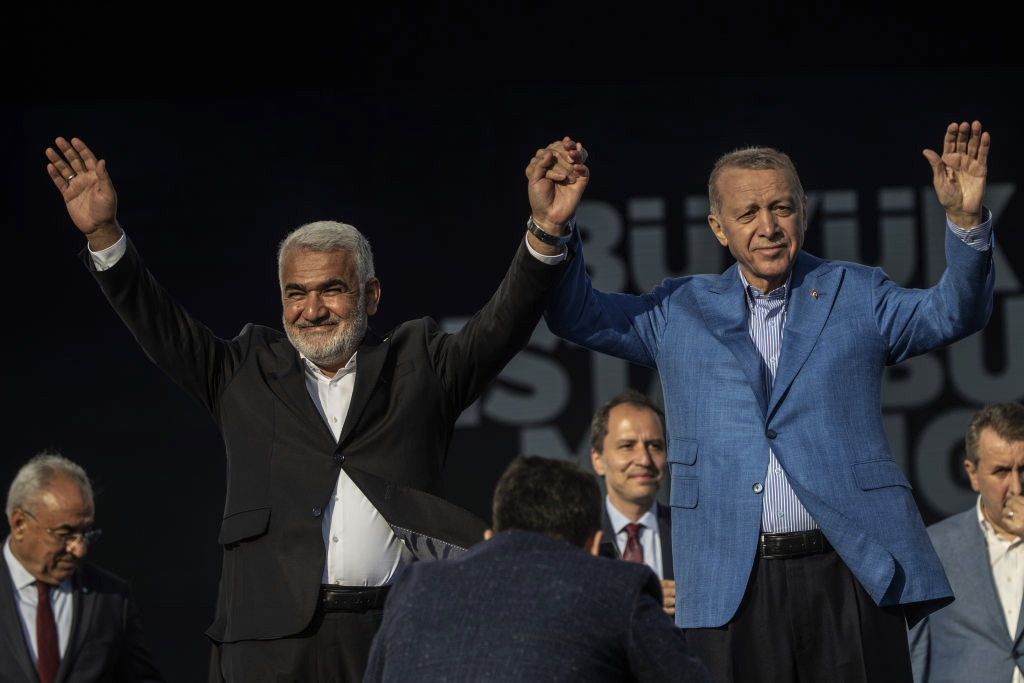
Turkey's Hizbullah is not to be confused with the Lebanese Shia terror group Hezbollah, although their name has the same meaning in Arabic: The Party of God. Turkey's Hizbullah is radically Sunni and pro-Kurdish.
At the peak of its violent campaign between 1991 and 2001, Turkey's Religious Affairs Directorate announced that the organization's ideology was "to fight every non-Islamic regime and administration in lands where Islam is not predominant." In those years, Hizbullah had nearly 100 associations and NGOs under its auspices.
After security operations against Hizbullah in 2000, the Turkish public was shocked to learn that the organization had abducted more than 100 rival Islamists, tortured and buried them in what was repugnantly dubbed "houses of graves."
Operating primarily in Batman Province, Hizbullah murdered 188 people in and around the mainly Kurdish city of Batman. The victims included 32 shot in the neck: men for drinking alcohol and women for wearing mini-skirts.
A prominent feminist Islamist, Konca Kuriş, was abducted by Hizbullah and tortured for 35 days before she was murdered. Her Islamism was fine; her feminism was not.
In 2001, Hizbullah assassinated Gaffar Okan, chief of police in Diyarbakır Province, home to the largest Kurdish city in southeastern Turkey, along with five police officers.
In 1992, Hizbullah murdered the journalist Halit Güngen, two days after he published an article about the terror group's covert ties with the Turkish deep state. Years later, the three Hizbullah hitmen, then imprisoned, were released by the government of President Recep Tayyip Erdoğan.
In 2000, Hizbullah's leader, Hüseyin Velioğlu, was killed in a shoot-out with the police in Istanbul. Former police chief Niyazi Palabıyık, who ran that operation, recently said that Erdoğan's government also released Edip Gümüş, a Hizbullah operative responsible for killing 250 people. The operation and the killing of Velioğlu dismantled the terror group but did not kill its spirit.
Hizbullah's terrorists regrouped, first as an association, then as a political party in 2012. They rebranded themselves with a name not too distant from Hizbullah: HÜDA-PAR (abbreviation for Party of God, also meaning "Free Cause.") Everyone knew the new party was a disguise for Hizbullah. Under Erdoğan's Islamist regime, no one cared.
In a recent television interview, HÜDA-PAR's chairman, Zekeriya Yapıcıoğlu, admitted that Hizbullah "may have been a terrorist organization," but in his view "it was not." He said: "Whenever there was an attack [by authorities against Hizbullah] they had to defend themselves." This is a language too familiar from the defenders of Hamas terrorists -- but not surprising. Yapıcıoğlu was one of the lawyers who defended Hizbullah's terrorists.
HÜDA-PAR's nationwide popularity is estimated to be a couple of hundred thousand in a country where there are more than 50 million registered voters. But even that tiny percentage of voters may rewrite history in Turkey's most critical elections in history scheduled for May 14. Erdoğan is no fool to see that he may need those votes in presidential and parliamentary elections.
Polls suggest that the presidential race will be tight, probably extremely tight. Most show that the gap is widening against Erdoğan. The average of 11 polls conducted in March put Erdogan's party's vote at 32.8% and its ultra-nationalist partner MHP's at 6.5%, with the latter failing to win any parliamentary seats as its nationwide vote falls below the 7% threshold.
By contrast, the opposition bloc would win a combined 55.4% of the nationwide vote. Reuters reported that new polls show the Turkish opposition's presidential candidate Kemal Kılıçdaroğlu leading against Erdoğan by more than 10 percentage points ahead of elections.
This is how the ruthless terror group Hizbullah's child HÜDA-PAR became Erdogan's most recent political ally. HÜDA-PAR declared that it would field candidates under Erdoğan's party's list in the parliamentary election. HÜDA-PAR also agreed to support Erdoğan's presidency.
"We thank HÜDA-PAR for extending their support for Erdoğan's presidency," Erdoğan's AKP Party spokesman Ömer Çelik said after the AKP's deputy chairman Ali Ihsan Yavuz visited HÜDA-PAR headquarters on April 3. Yavuz said that HÜDA-PAR will have "an appropriate number of MP seats" in return for its support for Erdoğan in the May election.
The international community would do well to understand that Kurds, US allies in northern Iraq and Syria, are not monolithic. Secular Kurds are allies. But there are also Islamist Kurds who support Erdoğan.
To win, Erdoğan would ally with radical Islamists: certified terrorists.
If Erdoğan does win on May 14, there will be, for the first time, radical Islamist terrorists in the Turkish parliament. Hizbullah terrorists -- responsible for the torture and deaths of hundreds of people in ISIS-style executions -- in the parliament of a NATO member state?! This potential outcome is the biggest talk among Western diplomats in Ankara. Most are shocked. They should not be. It is vintage Erdoğan.
Burak Bekdil, one of Turkey's leading journalists, was recently fired from the country's most noted newspaper after 29 years, for writing in Gatestone what is taking place in Turkey. He is a Fellow at the Middle East Forum.


